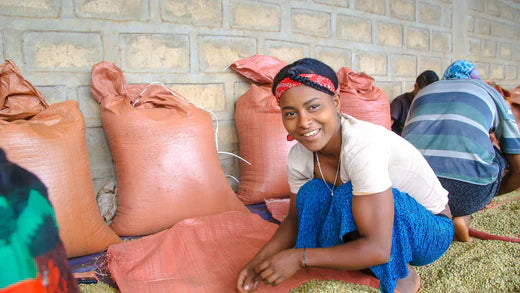It’s probably no surprise to you that caffeine boosts sports performance. But athletes need more than just a boost for performance, they need a boost for recovery as well, and coffee provides both. Scientists agree and research suggests that athletic performance can be improved with just a moderate amount of coffee consumption, for both endurance and even high-intensity type athletics. Enjoying flow coffee can be one way athletes align performance benefits with clean, health-focused choices.
The performance benefits of coffee include:
- Delaying exhaustion
- Reducing pain
- Supporting endurance and high-intensity performance
- Helping the body recover more quickly from exercise
Today, the overall body of scientific evidence supports that there are many performance benefits that can be seen across a range of sports with just a moderate consumption of coffee (about 2-3 cups of coffee, which has approximately 200-300 mg of caffeine). Studies have found performance enhancements in sports such as running, team and racquet sports, cycling, skiing, weightlifting, swimming, and rowing.
In addition to the caffeine boost it provides, coffee contains polyphenols, which reduce inflammation and aid in recovery time so you can train harder and recover quicker. Optimizing your coffee can optimize your performance, but know that not all coffees are created equal.
How does caffeine work for performance?
Caffeine is multi-faceted—it isn’t just a substance that staves off drowsiness. Technically, caffeine has an antagonist effect on the adenosine receptors in the brain. This is the pathway that leads to the production of adrenalin, stimulates energy production, and improves blood flow. At the same time, this blocking of adenosine receptors reduces fatigue and perception of exertion and even pain, which is proposed to lead to athletic performance improvements.
Caffeine may simply make you less tired during exercise, allowing you to go further, longer, and harder than without it. It may also modulate what scientists call “central fatigue”, a type of fatigue caused by neurochemical changes in the brain associated with prolonged exercise, and in turn influence ratings of perceived exertion, perceived pain, and levels of vigor, all of which are likely to lead to improvements in performance.
There is also evidence that caffeine, as an adenosine receptor antagonist, reduces pain. It is well known in the medical field that it produces adjuvant analgesic properties when in combination with non-steroidal anti-inflammatory drugs and acetaminophen (Tylenol) and has been also shown to affect nerves in the body. In this way, caffeine may also reduce the sensations of pain associated with muscle work or physical activity.
In addition, we know that coffee offers other advantages that can be beneficial for athletes, mostly leading from the other natural compounds found in coffee, called polyphenols. These compounds have been linked to antioxidant and anti-inflammatory activity in the body. One group of notable polyphenols in coffee, called chlorogenic acids, have been linked to many health benefits in different sites in the body. These compounds are typically the highest in lighter or medium roasted coffees, as they degrade during the roasting process. Chlorogenic acids and other polyphenols have been suggested to positively contribute to lowering inflammation in the body, which can be an important consideration of novice and professional athletes alike.
Chlorogenic acid lactones have received attention because of their potential effects on brain function independent of the pharmacologic effects of caffeine. They exhibit opiate receptor binding activity with characteristics similar to those of opiate antagonists, although these are relatively weak in vitro, further studies need to be conducted with normal coffee consumption.
Coffee can improve endurance and performance in high-intensity sports
There is a lot of evidence and many scientific studies for over a century to back up that caffeine ingestion improves endurance sports performance. These studies show a pretty consistent benefit in endurance exercise by decreasing perceived exertion and increasing time to exhaustion. In 2011, the European Food Safety Authority (EFSA) reported a credible “cause and effect relationship” had been established between the consumption of caffeine and an increase in endurance performance.
There is also promising research on the effects of coffee on short-term, high-intensity physical performance. A study specifically using coffee by Wiles and others 21 found that the ingestion of coffee led to an increased speed for the 1500-meter run, and that the speed of the “finishing burst” was enhanced. Certainly, more research should follow this and similar studies in order to elucidate the actual benefit of drinking coffee, as opposed to taking a sports supplement or caffeine pill!
How to train harder and recover faster
It is inevitable that athletes injure themselves from time to time. Inflammation is a physiological response to tissue injury. The reduction of inflammation resulting in enhanced wound healing has been reported for chlorogenic acids. Oral administration of 5-CQA at a dose of 50 mg/kg/day accelerated wound healing and decreased lipid peroxidation products by reducing inflammatory responses and increasing antioxidant defense systems.
In a large study on mortality, researchers looked at coffee’s impact on health and longevity. They concluded that coffee favorably affected inflammation, lung function, insulin sensitivity, and depression, which also are related to recovery after intense athletic activity.
The legality of caffeine usage in elite athletic competitions
How much does caffeine improve performance, exactly? The level of athletic performance improvement shown in scientific studies is on average between 1-3 percent, depending on the dose of caffeine and the intended physical activity. Doesn’t sound like much? Consider an elite athletic competition, such as the Olympics - when you are competing in elite endurance-type competitions, 3% can often mean the difference between the top five placements. Because of this, it is extremely common for professional athletes to include caffeine in their training and competition regimes.
The World Anti-Doping Agency (WADA) does not currently list caffeine as a banned substance. WADA did have caffeine on its list for three decades (specifically from 1984 – 2004), during which time, athletes could be thrown out of competition if their urine contained more than 12 micrograms per milliliter of caffeine. WADA ended up removing caffeine from the banned list because it decided that performance-enhancing doses were almost indistinguishable from what some people would consider “normal consumption”. Caffeine is just so ubiquitous in the world and especially the athletic community that they did not want to punish athletes for something that many would consider as ordinary daily consumption. An issue that complicates this was that monitoring and testing for caffeine is not precise because the rate of metabolism changes per person. Thus, the international Olympic Committee is not currently prohibiting caffeine.
Therefore, since 2004, athletes have been able to freely sip coffee or consume caffeine by other methods, such as energy drinks or caffeine pills. After caffeine was dropped from the list, during the following four years caffeine was consistently found in approximately 74% of monitored athletes, illustrating that the use of caffeine is widespread in athletic populations. Today it is still monitored, only for tracking purposes.
The US National Collegiate Athletic Association (NCAA) still includes caffeine on their 2018-19 list of banned drugs, making it one of the few organizations to still limit caffeine use in athletic competitions. They limit caffeine to a concentration of below 15 micrograms per milliliter in urine tests, which corresponds to about 500 mg of caffeine in the 2-3 hours prior to competing. Remember, a “cup” of brewed, black coffee can vary from about 75-250 mg, depending on the strength of the brew and size of the cup. This means that to be safe, college athletes should likely not consume more than 2 cups of coffee in the time before their competition. The bonus for college athletes is that although caffeine levels are regulated, polyphenols are not.
How can you include coffee in your athletic endeavors?
Research has shown that drinking a moderate number (2-3) of cups of coffee prior to exercise is enough to show results. Specifically, 3 mg/kilo, or 3 mg/1.36 pounds dose would mean that a 180-pound athlete would want 145 mg of caffeine, which is equivalent to about 2-3 cups of drip coffee, depending on what size & strength of a brew you get. This is not an outrageous amount of coffee, but you may find that it has good results for you. In fact, some research suggests that a dose of as little as 200 mg (or about 1-2 cups of coffee) can enhance your athletic performance.
Added to the already known and established benefits of coffee consumption, such as living longer, reducing the risk of diabetes & liver disease, and improving cardiovascular health; drinking coffee has even been found to be associated with weight reduction and lower rates of obesity.
This is great evidence for listening to your own body and making sure you drink the healthiest coffee possible for your own sport needs. In the end, even if you don’t feel a large difference in your athletic endeavors due to caffeine, there are other great reasons to keep up the coffee! The healthy polyphenolic compounds found in coffee, such as chlorogenic acids, may benefit you whether or not you use coffee for sport. We know that coffee, as a complex beverage, can support a healthy lifestyle, including a suite of health benefits such as decreasing your risk of type 2 diabetes, promoting liver health, and longevity. Use healthy, clean, Purity Coffee to your advantage in any way that feels right for you – whether it’s helping you get through a half-marathon, or simply contributing to your already healthy lifestyle.
A call to action!
The effects of caffeine on sports performance is well studied, but coffee’s antioxidant effects on athletes’ enhanced recovery and increased performance over time is not. We are looking for professional and semi-professional athletes in speed-sports (running, cycling, swimming, etc.) and sports that involve concentration and clarity (gymnastics, golf, tennis) to help us conduct a study on coffee's performance-enhancing effects. If you would be interested in participating, click here for an application. We will send the participants in our trial four bags per month for two months, and we only require that you drink Purity’s clean, organic, antioxidant-rich coffee and keep a log or diary of your performance and recovery as you train and compete. If you are currently drinking decaf, the same offer applies! Apply Now
References:
- Loftfield, E.; Freedman, N. D.; Graubard, B. I.; Guertin, K. A.; Black, A.; Wen-Yi, H.; Shebl,
- F. M.; Mayne, S. T.; Rashmi, S., Association of coffee consumption with overall and cause- specific mortality in a large us prospective cohort study. American Journal of Epidemiology 2015, 182, 1010-1022.
- Carlström, M.; Larsson, S. C., Coffee consumption and reduced risk of developing type 2 diabetes: a systematic review with meta-analysis. Nutrition Reviews 2018, 76, 395-417.
- Molloy, J. W.; Calcagno, C. J.; Williams, C. D.; Jones, F. J.; Torres, D. M.; Harrison, S. A., Association of coffee and caffeine consumption with fatty liver disease, nonalcoholic steatohepatitis, and degree of hepatic fibrosis. Hepatology 2011, 55, 429-436.
- Tajik, N.; Tajik, M.; Mack, I.; Enck, P., The potential effects of chlorogenic acid, the main phenolic components in coffee, on health: a comprehensive review of the literature. 2017, 2215.
- Liu, J.; Sui, X.; Lavie, C. J.; Hebert, J. R.; Earnest, C. P.; Zhang, J.; Blair, S. N., Association of Coffee Consumption With All-Cause and Cardiovascular Disease Mortality. Mayo Clinic Proceedings 2013, 88, 1066-1074.
- Rivers, W. H. R.; Webber, H. N., The action of caffeine on the capacity for muscular work. The Journal of Physiology 1907, 36, 33-47.
- Costill, D. L.; Dalsky, G. P.; Fink, W. J., Effects of caffeine ingestion on metabolism and exercise performance. Medicine and science in sports 1978, 10, 155-8.
- Grgic, J.; Grgic, I.; Pickering, C.; Schoenfeld, B. J.; Bishop, D. J.; Pedisic, Z., Wake up and smell the coffee: caffeine supplementation and exercise performance—an umbrella review of 21 published meta-analyses. British Journal of Sports Medicine 2019, bjsports-2018-100278.
- Doherty, M.; Smith, P. M., Effects of Caffeine Ingestion on Exercise Testing: A Meta- Analysis. International Journal of Sport Nutrition & Exercise Metabolism 2004, 14, 626-646.
- Salinero, J. J.; Lara, B.; Del Coso, J., Effects of acute ingestion of caffeine on team sports performance: a systematic review and meta-analysis. Research in Sports Medicine 2019, 27, 238-256.
- Ellis, M.; Noon, M.; Myers, T.; Clarke, N., Low Doses of Caffeine: Enhancement of Physical Performance in Elite Adolescent Male Soccer Players. International Journal of Sports Physiology & Performance 2019, 14, 569-575.
- Clarke, N. D.; Richardson, D. L.; Thie, J.; Taylor, R., Coffee Ingestion Enhances 1-Mile Running Race Performance. International Journal of Sports Physiology & Performance 2018, 13, 789.
- Grgic, J.; Trexler, E. T.; Lazinica, B.; Pedisic, Z., Effects of caffeine intake on muscle strength and power: a systematic review and meta-analysis. Journal of the International Society of Sports Nutrition 2018, 1.
- Burke, L. M., Caffeine and sports performance. Applied Physiology, Nutrition and Metabolism 2008, 33, 1319-1324.
- Jung, S.; Kim, M. H.; Park, J. H.; Jeong, Y.; Ko, K. S., Cellular Antioxidant and Anti- Inflammatory Effects of Coffee Extracts with Different Roasting Levels. Journal of Medicinal Food 2017, 20, 626-635.
- Liang, N.; Xue, W.; Kennepohl, P.; Kitts, D. D., Interactions between major chlorogenic acid isomers and chemical changes in coffee brew that affect antioxidant activities. Food Chemistry 2016.
- Quiñones, M.; Miguel, M.; Aleixandre, A., Beneficial effects of polyphenols on cardiovascular disease. Pharmacological Research 2013, 68, 125-131.
- Palaska, I.; Papathanasiou, E.; Theoharides, T. C., Use of polyphenols in periodontal inflammation. European Journal of Pharmacology 2013, 720, 77-83.
- Laurence, G.; Wallman, K.; Guelfi, K., Effects of caffeine on time trial performance in sedentary men. Journal of Sports Sciences 2012, 30, 1235-1240.
- Spriet, L. L., Exercise and Sport Performance with Low Doses of Caffeine. Sports Medicine 2014, 44, 175-184.
- Wiles, J. D.; Bird, S. R.; Hopkins, J.; Riley, M., Effect of caffeinated coffee on running speed, respiratory factors, blood lactate and perceived exertion during 1500-m treadmill running. British Journal Of Sports Medicine 1992, 26, 116-120.
- Hodgson, A. B.; Randell, R. K.; Jeukendrup, A. E., The metabolic and performance effects of caffeine compared to coffee during endurance exercise. Plos One 2013, 8, e59561-e59561.
- Higgins, S.; Straight, C. R.; Lewis, R. D., The Effects of Preexercise Caffeinated Coffee Ingestion on Endurance Performance: An Evidence-Based Review. International Journal of Sport Nutrition and Exercise Metabolism 2016, 26, 221-239.
- Davis, J. M.; Zhao, Z.; Stock, H. S.; Mehl, K. A.; Buggy, J.; Hand, G. A., Central nervous system effects of caffeine and adenosine on fatigue. American Journal of Physiology- Regulatory, Integrative and Comparative Physiology 2003, 284, R399-R404.
- Astorino, T. A.; Terzi, M. N.; Roberson, D. W.; Burnett, T. R., Effect of Caffeine Intake on Pain Perception During High-Intensity Exercise. International Journal of Sport Nutrition and Exercise Metabolism 2011, 21, 27-32.
- Sawynok, J., Adenosine receptor activation and nociception. European Journal of Pharmacology 1998, 347, 1-11.
- Keisler, B. D.; Armsey, T. D., Caffeine As an Ergogenic Aid. 2006, p 215.
- Ganio, M. S.; Klau, J. F.; Casa, D. J.; Armstrong, L. E.; Maresh, C. M., Effect of Caffeine on Sport-Specific Endurance Performance: A Systematic Review. The Journal of Strength & Conditioning Research 2009, 23.
- EFSA Panel on Dietetic Products, N.; Allergies, Scientific Opinion on the substantiation of health claims related to caffeine and increase in physical performance during short-term high- intensity exercise (ID 737, 1486, 1489), increase in endurance performance (ID 737, 1486), increase in endurance capacity (ID 1488) and reduction in the rated perceived exertion/effort during exercise (ID 1488, 1490) pursuant to Article 13(1) of Regulation (EC) No 1924/2006. EFSA Journal 2011, 9, 2053.
- Astorino, T. A.; Terzi, M. N.; Roberson, D. W.; Burnett, T. R., Effect of Two Doses of Caffeine on Muscular Function during Isokinetic Exercise. In 2010; Vol. 42, pp 2205-2210.
- Astorino, T. A.; Roberson, D. W., Efficacy of acute caffeine ingestion for short-term high- intensity exercise performance: a systematic review. Journal of Strength and Conditioning Research 2010, 24, 257-65.
- Glaister, M.; Gissane, C., Caffeine and Physiological Responses to Submaximal Exercise: A Meta-Analysis. International Journal of Sports Physiology & Performance 2018, 13, 402-411.
- Del Coso, J.; Muñoz, G.; Muñoz-Guerra, J., Prevalence of caffeine use in elite athletes following its removal from the World Anti-Doping Agency list of banned substances. Applied Physiology, Nutrition & Metabolism 2011, 36, 555-561.
- Pickering, C.; Kiely, J., Are the Current Guidelines on Caffeine Use in Sport Optimal for Everyone? Inter-individual Variation in Caffeine Ergogenicity, and a Move Towards Personalised Sports Nutrition. Sports Medicine 2018, 48, 7-16.
- Guest, N.; Corey, P.; Vescovi, J.; El-Sohemy, A., Caffeine, CYP1A2 Genotype, and Endurance Performance in Athletes. Medicine & Science in Sports & Exercise 2018, 50, 1570- 1578.
- Buscemi, S.; Marventano, S.; Antoci, M.; Cagnetti, A.; Castorina, G.; Galvano, F.; Marranzano, M.; Mistretta, A., Coffee and metabolic impairment: an updated review of epidemiological studies. NFS Journal 2016, 3, 1-7.
- Farah, A. Chapter 2.1 Coffee Constituents, in Coffee: Emerging health effects and disease prevention, First Edition. Edited by Yi-Fang Chu. 2012 John Wiley & Sons, Inc.
- Liang, N. and Kitts, D. Role of Chlorogenic Acids in Controlling Oxidative and Inflammatory Stress Conditions. Nutrients. 8, 16; doi:10.3390/nu8010016. 2015.








Leave a comment